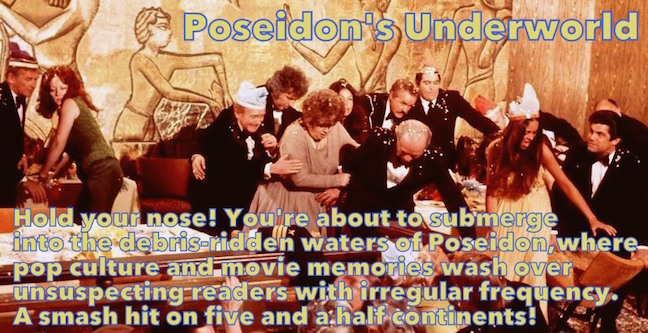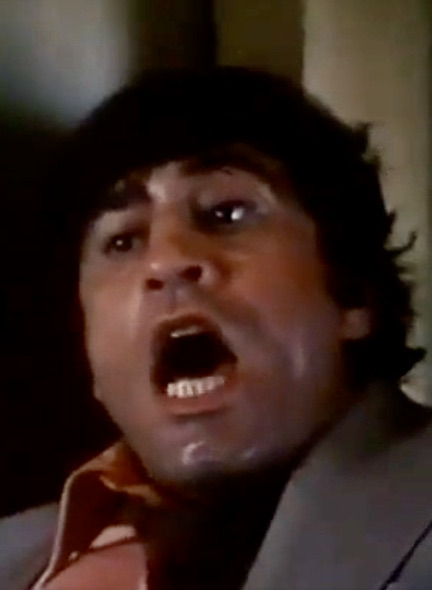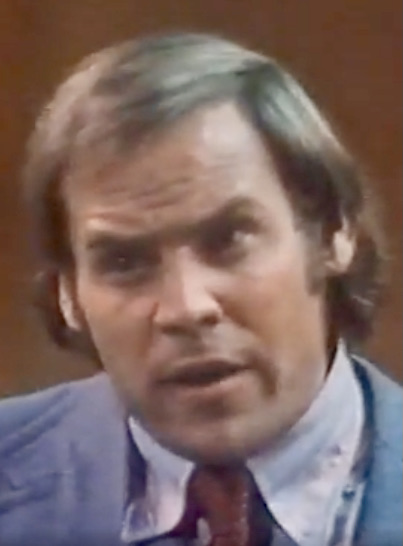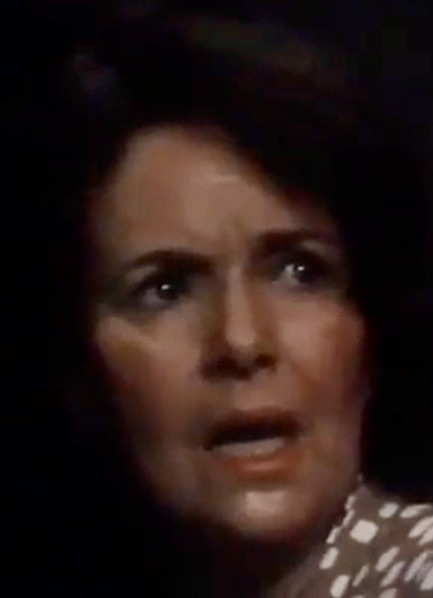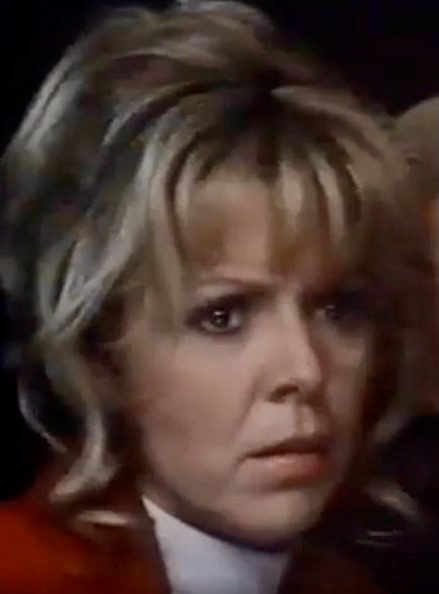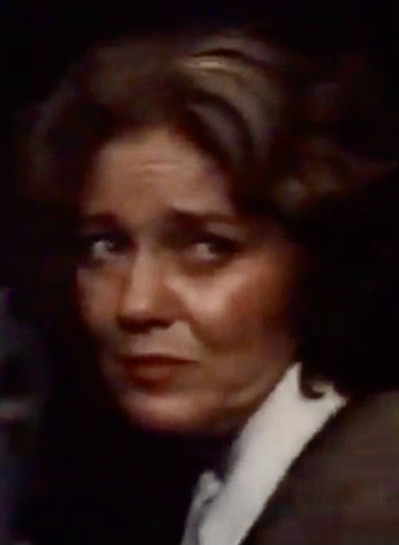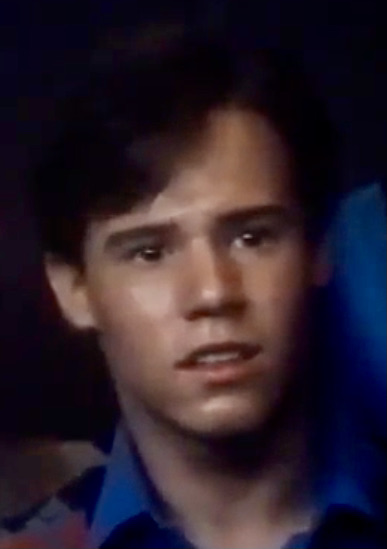I suppose it depends on one's point of view, but it seems likely that the participants of this 1974 telefilm, regardless of how well they did in it, were headed in the wrong career direction.
The Elevator, although not without its humble charms, is a microcosm-like distillation of the then-blossoming 1970s disaster movie cycle. It concerns a disparate group of people trapped in one place, facing peril. On the surface, it almost seems like a parody one might see on The Carol Burnett Show; "The Phone Booth" or "The Short Yellow Bus." (In fact, in 1976,
The Big Bus came along several years before
Airplane!, 1980, and skewered the genre.)
 |
Our saga begins with Carol Lynley driving her boyfriend James Farentino through downtown Los Angeles to a high-rise office building. They're particularly interested in the goings on around an armored car where a guard is transporting a briefcase into the building.
|
 |
| It's a holiday weekend and the tower is going to be closed for three days. As it's near time to fold up right now, the parking attendant informs them that they should put their car nearby for about 15 minutes, but instead she ignores him and heads back into the recesses of the lot! |
|
|
 |
Meanwhile, well-heeled Myrna Loy has enlisted the building's leasing agent Roddy McDowall to take her on a tour, including the penthouse suite.
|
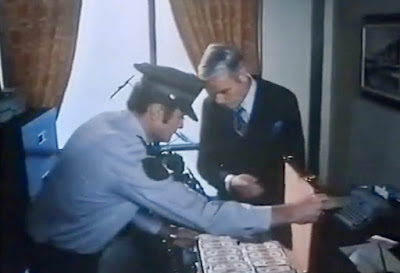 |
The guard delivers a briefcase filled with $100 bills to an exec with an investment company.
|
 |
Once Lynley has located the parking spot she wanted, Farentino opens the trunk and out pops Don Stroud! No... they aren't showing a drive-in movie in the garage and trying to get three admissions for the price of two. It seems this trio is up to no good.
|
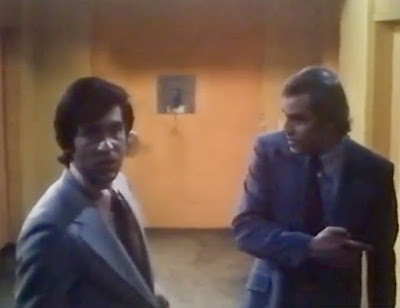 |
Farentino and Stroud are heading upstairs to take care of some business. Farentino is already edgy before they've even started as he isn't fond of enclosed spaces...
|
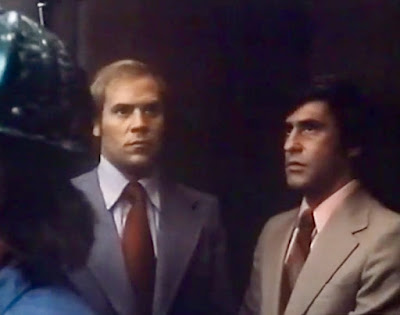 |
...and what's more enclosed than an elevator?! Not to worry, though, just yet. This is merely the trip up.
|
 |
Also on board for this quick trip are McDowall and Loy.
|
 |
Meanwhile, Lynley waits (and waits!) in the car.
|
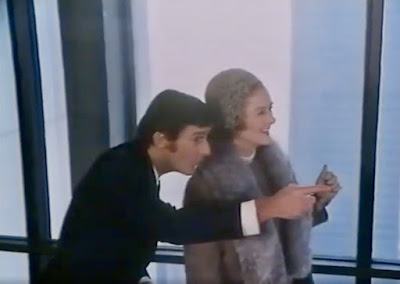 |
Old time Hollywood pros McDowall and Loy have palpable rapport with one another as he shows her around. The big gasp, though, was the real and true L.A. SMOG one always used to hear about back in the day, visible through the penthouse windows.
|
 |
Farentino and Stroud head to the investment company where trigger-happy Stroud kills the executive!
|
 |
For their trouble, through, they get a briefcase packed with moolah.
|
 |
On another floor, we see a lady helping to decorate her doctor husband's waiting room with an arrangement of paintings.
|
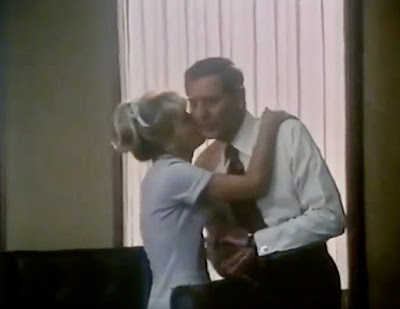 |
Back in his office, he's got an arrangement of his own... with his secretary!
|
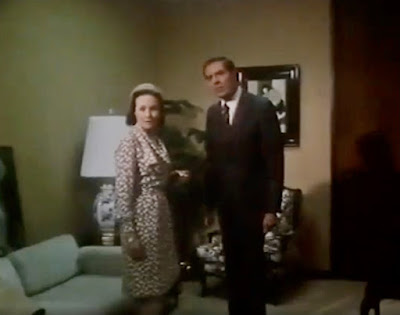 |
The couple are slightly taken aback when McDowall arrives with Loy and asks if he can show her how the office has been divided up and designed.
|
 |
If it isn't clear from the prior photo, this couple is played by Craig Stevens and Teresa Wright.
|
 |
The secretary who threatens to spoil their relationship is Arlene Golonka.
|
 |
Next we meet a young man and his mother, who are having a disagreement over some legal papers. It seems he is to inherit a trust from his late father, but not until he reaches 21. And his mother either can't or won't try to help him to get his hands on it sooner.
|
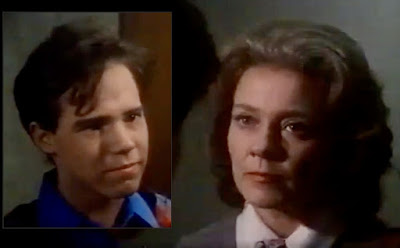 |
Said roles are essayed by Barry Livingston and Jean Allison.
|
 |
It's close to quittin' time and so the elevator down is beginning to fill up. As you gaze upon Wright and Loy together in the lift, see if this combination means anything to you at all.
|
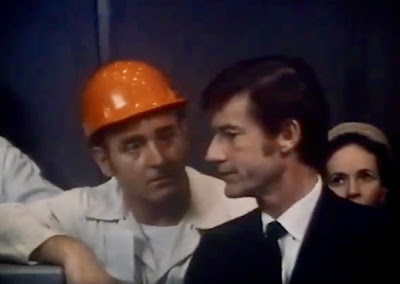 |
McDowall tussles with a workman who is transporting a 700 lb safe from one floor to another, chiding him for not using the freight elevator.
|
 |
When it makes a stop, Farentino boards it, but McDowall prevents Stroud from joining him, insisting instead that Allison and Livingston be let on! Thus, with no more room...
|
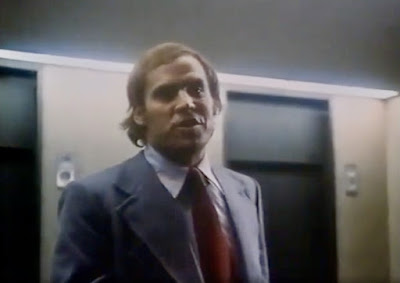 |
...a disgruntled Stroud is left all alone while Farentino - and the money! - are headed down to the ground.
|
 |
The two dunderheads moving the safe (since when do people wear hardhats in order to push a safe on wheels...?) can't get it out without clanking and banging it around. In the process, they beat the shit out of the are where the elevator car meets the building.
|
 |
Somehow, and only the writer knew for sure, this leads to rivets falling out of girders, circuitry clicking away madly and sparks flying out of machinery!!!
|
 |
The remaining four men and four women begin their descent, but soon are made aware that something isn't right.
|
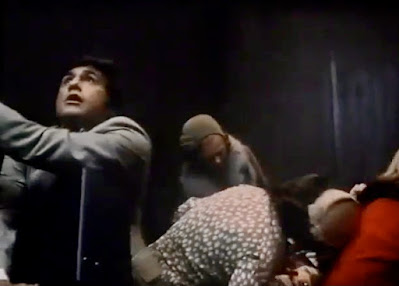 |
They cling to the walls and to one another as the car begins careening down several floors!
|
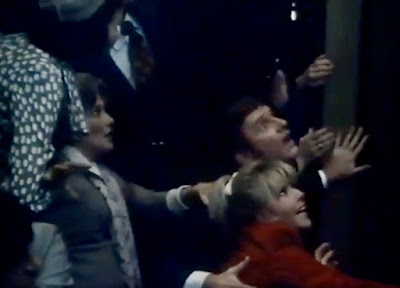 |
They come to rest around the 32nd floor. But it's not exactly the easiest landing, nor the ideal spot.
|
 |
McDowall attempts to raise some help with the alarm button, but it is inoperative. (Note the hilarity of a second unit shot in which the button is filmed against a yellow-painted wall while the button in the elevator is not only set in a brushed bronze panel, but has other gadgets around it!)
|
 |
In the wake of all this, Stroud, safely in the basement garage, is convinced that Farentino has run out on him and kept the money for himself. Lynley protests that such a thing isn't possible and that there must be another reason for him not coming down to join them.
|
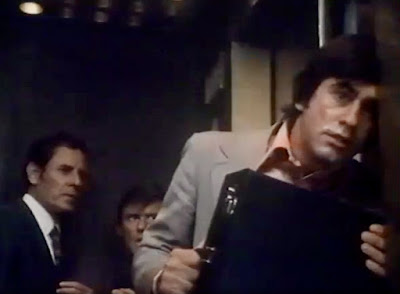 |
Farentino is becoming more and more erratic the longer the elevator is at a standstill.
|
 |
At last McDowall thinks to use the emergency phone (ya think?!), but when he opens the little door, there isn't anything in there but disconnected wires!
|
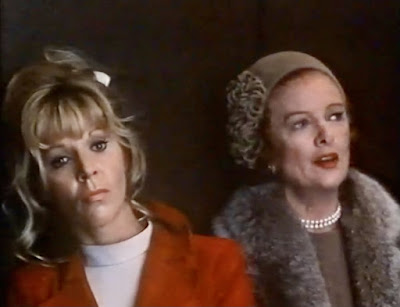 |
Things aren't bad enough. Now Loy has to go into a tale about that time back in Philadelphia when she was stuck in another elevator. (I guarantee that if you watch this movie and play a drinking game with one shot for every one of Loy's utterances of "Philadelphia," you will be hospitalized.)
|
 |
Down in the garage, a security guard asks Stroud and Lynley to clear out. Nothing they say can dissuade him and, remarkably, they leave the garage rather than Stroud blowing his head off!
|
 |
Once the inhabitants of the elevator have reached the end of Loy's story, they find out that she managed to be rescued when all the people inside screamed in unison. They try that. Trouble is... they are on the 32nd floor and floors 28-35 are still under construction and there is no one anywhere near them to hear the commotion!
|
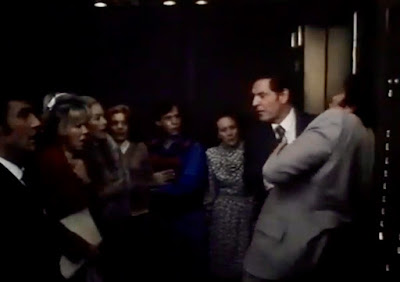 |
This is all too much for Farentino and he begins to royally freak out.
|
 |
Dr. Stevens uses the manila envelope from Livingston's trust papers to get the hyperventilating Farentino's breathing under control.
|
|
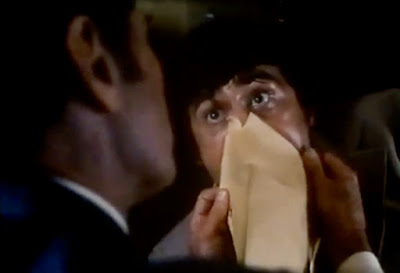 |
I understand Elizabeth Ashley and Michele Lee used to sometimes dream of bagging Jimmie's face like this during their marriages to him. Ha ha ha!
|
 |
As time wears on, it dawns on the captives that they might try looking for an escape hatch on top of the elevator car.
|
 |
Stevens and McDowall double-team Livingston and raise him up so that he can remove the ceiling panel and open the hatch.
|
 |
It's a tough job, but someone's gotta do it.
|
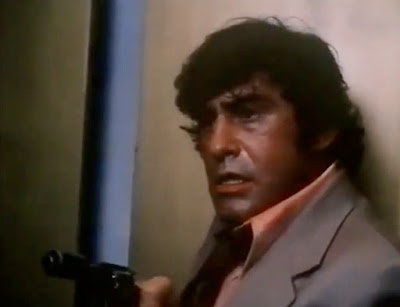 |
Farentino is so desperate to get out of the elevator that he pulls his gun! He orders Livingston back inside and determines that he will be the one to get out.
|
 |
This promo still of Stevens protecting the others from deranged Farentino must have been from a rehearsal. At no time does he remove his suit jacket during the movie.
|
 |
Following a scuffle with Golonka, Farentino's briefcase spills out, revealing the many thousands of dollars he's been safeguarding the whole time. He hurls it up through the escape hatch and follows himself.
|
 |
Once up there, though, he can't get the doors to the building to pry apart. He forces Livingston to come up and help, but it's no use. So he begins screaming. (This is a performance that lets us in on all the dental work Farentino ever had done to that time...) Next he starts firing off his gun!
|
 |
The car falls a bit more and Livinston careens back inside while Farentino clings to cables above. (He isn't afraid of heights, luckily for him. Just enclosed spaces!)
|
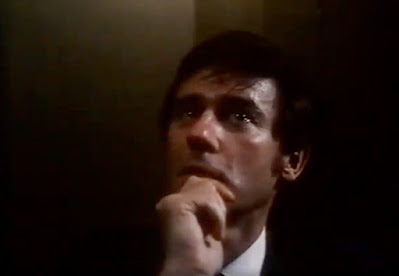 |
Now some personal reflections begin to emerge... Roddy has a confession to make. (And, no, it isn't the one you may be thinking of!)
|
 |
Livingston has seen the light that money doesn't guarantee happiness.
|
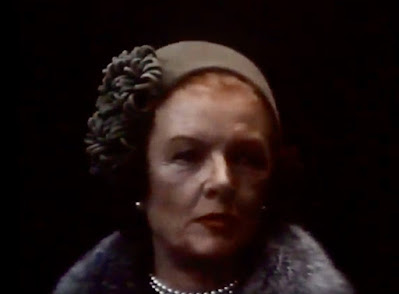 |
Eventually, Loy gets in on the action, too.
|
 |
Farentino is still raging.
|
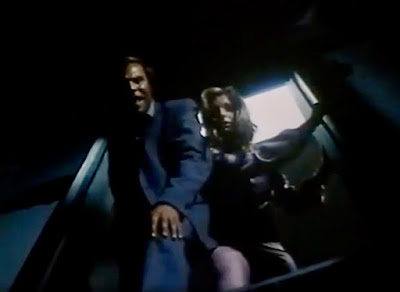 |
He finally gets the attention of Stroud and Lynley, who've weaseled their way back into the near-deserted building.
|
 |
Having heard the voices above, there's is hope among the stranded that a way out may finally have been discovered.
|
 |
Stevens is quick to point out, however, to the weary victims that the voices sound like accomplices, not rescuers! They're going to have to sit tight rather than try to emerge until Farentino and his cronies are gone.
|
 |
Farentino and Lynley are at last reunited when he's pulled from the elevator shaft.
|
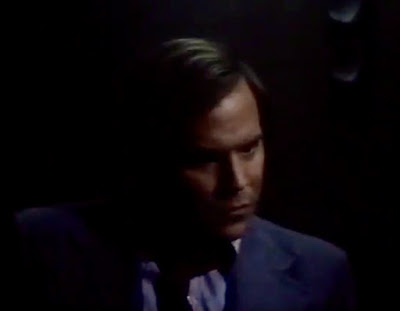 |
Stroud is more than unhappy to find out that the people in the elevator have seen all the money.
|
 |
Believing the coast to be clear, Stevens and McDowall hoist the young man back up to the escape hatch so that they might finally get out of the elevator.
|
 |
Stroud, though, has other ideas in mind. He's gotten hold of an acetylene torch from one of the construction areas and is now trying to sever the cable, which would send the folks in the elevator tumbling to certain doom!
|
 |
The horrified occupants can only scream through the hatch as they see their future evaporating.
|
 |
Ring a bell? LOL Terence Stamp & Co. faced a similar fate in Superman (1978.)
|
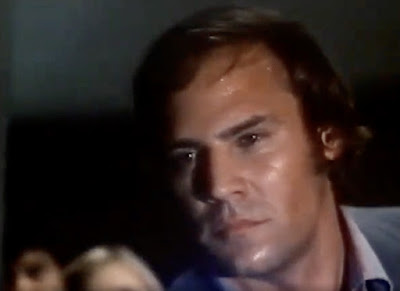 |
Stroud wants any potential witnesses dead.
|
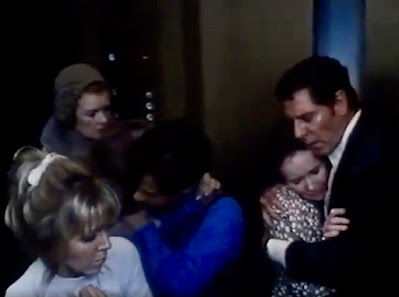 |
As the elevator occupants wonder if they'll make it, decisions are made (such as Stevens clinging to his wife rather than his mistress.) What happens next? There's still a fair amount to go, but I won't spoil it. This movie can be seen on YouTube and elsewhere in prints of varying quality (it surely looked a lot better when it was first aired.) You can click here to see the version I watched.
|
After some experience on the stage, Farentino began working on TV and in supporting movie roles in the early-1960s. His demand increased as the decade continued, winning a Golden Globe for Most Promising Newcomer and popping up in
Banning (1967),
Rosie! (1967) and
Me, Natalie (1969.) Amid many TV guest appearances, he was featured on
The Bold Ones: The Lawyers for three years. An Emmy nomination came for
Jesus of Nazareth as Simon but he lost to Howard Da Silva in
Verna: USO Girl. He was in 1980's
The Final Countdown before joining the cast of
Dynasty in its second season. Always busy, he began to run into problems in the early-1990s with a cocaine bust (though rebounded as Jose Menendez in
Honor Thy Father and Mother, 1994.) There were also charges of stalking then-girlfriend Tina Sinatra and a physical altercation with a man at his house. Retiring with health concerns in the early-2000s, he died of heart failure in 2012 at 73.
McDowall was a highly successful child actor, featured in
How Green Was My Valley (1941) among many others, who proceeded to the Broadway stage and a wealth of acting on live TV. He took home an Emmy in 1961 for his work on
Our American Heritage. An established adult performer, he acted in
Midnight Lace (1960),
The Longest Day (1962) and
Cleopatra (1963), in which a paperwork error denied him a shot at an Oscar nom. When not starring in offbeat fare like
Lord Love a Duck (1967) or
It! (1966), he essayed supporting parts. He had a career-defining one of those (under heavy makeup) in
Planet of the Apes (1968) and its sequels. Needless to say, he was also among the cast of
The Poseidon Adventure (1972), also filming a cameo for
Flood (1976.) A busy actor, highly popular among his peers, he worked steadily in countless movies and TV shows until lung cancer claimed him in 1998 at age 70.
Stevens had begun working in movie bit parts in 1939, eventually working up to leading roles in B movies and costarring in quite a few 1940s WWII films.
Dive Bomber (1941),
Spy Ship (1942) and
The Doughgirls (1944) are a few of his titles. There were also supporting parts in bigger movies such as
Humoresque (1946.) With the 1950s came plenty of work on television in a wide variety of parts (though, in truth, he often came off as a bit staid on screen.) He really hit it big in 1958 with the slick private detective show
Peter Gunn. He gained an Emmy nomination for that show, but it was won by Raymond Burr of
Perry Mason. Thereafter came many guest roles on TV up through 1988 when he retired. When he died in 2000 of cancer at age 81, he'd been married to Alexis Smith for nearly 50 years.
6'2" Stroud was a black belt in karate at 16 and an internationally ranked surfer at 17, having been born and raised in Hawaii. Troy Donahue hired him as a double for
Hawaiian Eye and as a bodyguard and after some other odd jobs he soon took up acting himself. As a Universal contractee, he appeared in
Banning,
Games,
The Ballad of Josie (all 1967) and proceeded to
Madigan and
Coogan's Bluff (both 1968.) As the 1970s dawned, he costarred in
Bloody Mama (1970) and starred in
Angel Unchained (1970) and
Von Richthoven and Brown (1971.) During filming of the latter, he survived a plane crash and saved the pilot's life. Countless TV and movie appearances followed, many of them as bad guys or tough guys thanks to his macho features and build. Under the "no good deed goes unpunished" rule, he tried to intervene in a mugging in 1990 and was stabbed 10 times, enduring facial paralysis and losing sight in his right eye, but he continued to act. Age 80 at present, he recently appeared as a guest on the new version of
Magnum P.I.As a young lady, Wright made almost immediate inroads on stage with Our Town and Life With Father. Samuel Goldwyn hired her for
The Little Foxes (1941) with Bette Davis and she was off and running with an Oscar nomination her first time out! (The award went to Mary Astor in
The Great Lie.) Her next two films garnered nominations in the very same year for Lead and Supporting. She won the Supporting Oscar for
Mrs. Miniver while losing for
Pride of the Yankees to
Miniver star Greer Garson. No other performer has ever been nominated for each of his or her first three films. Her carefully guided career proceeded to
Shadow of a Doubt (1943) for Alfred Hitchcock and 1946's Best Picture winner,
The Best Years of Our Lives. A falling out with Goldwyn in 1948 decreased her standing a bit, though she continued to work (albeit for less money.) She returned to the stage while also doing much work on TV. She appeared in the Irwin Allen telefilm
Flood (1976) among many other projects. One notable latter-day title was
Somewhere in Time (1980.) Continuing to act through the mid-1990s, she passed away in 2005 at age 86 from a heart attack.
When you want to talk about talented, versatile performers who were overlooked by the Academy of Motion Picture Arts and Sciences, one of the most baffling was Loy, who was in movies from 1925 to 1980 and never received so much as a single nomination. In 1991, she was belatedly presented with an Honorary Oscar for her remarkable body of work. After years of toiling away as exotic villainesses or mysterious beauties, Loy emerged as a delightful comedienne in
The Thin Man (1934) and its sequels,
Wife vs Secretary (1936),
Libeled Lady (1936) and others. When Clark Gable was crowned King of Hollywood, it was the immensely popular Loy who was crowned Queen. Still another shift came when she began portraying ideal wives, notably in
The Best Years of Our Lives (1946),
Mr. Blandings Builds His Dream House (1948) and
Cheaper By the Dozen (1950.) Later turning to colorful supporting parts in films while also establishing a stage career, she popped up occasionally on TV. Of course, we revere the fact that she was in
Airport 1975 (1974) and have also featured the hooty
It Happened at Lakewood Manor (1977) on this site. Loy retired in 1982 and suffered from poor health until her death following surgery in 1993 at age 88.
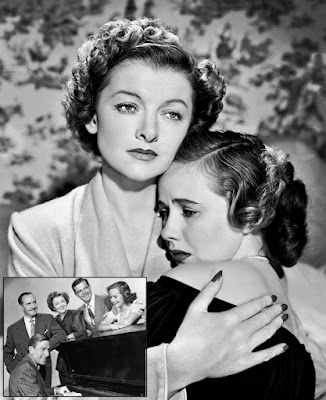 |
Thirteen years apart in age, Loy and Wright had portrayed mother and daughter in The Best Years of Our Lives. This is why I asked earlier if anyone took notice of their being put together in The Elevator.
|
 |
Thankfully, someone on set had the wherewithal to mark the occasion of their on-screen reunion with a photo. They're certainly happier in this pic than their characters were permitted to be during the movie's dramatic plot line.
|
As a cast member of
The Poseidon Adventure (1972), Lynley is a bona fide member of our (imaginary) Disaster Movie Club. A child model-turned-actress, she had a healthy movie career in the 1950s and '60s. You can read more about her work in
this post, which was put together after her death in 2019 at age 77. (Like McDowall and Wright, Lynley also worked on
Flood, though - strangely - none of the three had any scenes with one another in it. She worked with McDowall a number of times, though, during their careers.)
The Elevator stars several members of the aforementioned Disaster Movie Club and Golonka is in that same group. A Broadway actress who eventually made the move to L.A. and its movie and TV opportunities, she became a semi-regular on
Mayberry, R.F.D. She also appeared in
Welcome to Hard Times (1967) and
Hang 'Em High (1968.) The director of
The Elevator, Jerry Jameson, remembered her when he took the helm of
Airport '77 (1977) and cast her as a distraught passenger and mother of an injured little girl. She also worked in the cult comedy film
The In-Laws (1979.) Busy on TV and also put to use for her distinctive voice in many animated programs, she worked until 2005. In time, Alzheimer's disease began to take its toll and that was what caused her demise in 2021 at age 85.
Perhaps the least known of the principal performers in this movie, Allison was the one-time wife of actor Lee Phillips (of
Peyton Place, 1957) who began acting on TV in the late-1950s. Already closing in on 30, she nonetheless found herself in high demand for the many television westerns which dominated the airwaves at the time. She probably appeared on virtually any hit western series you could name, along with other types of series. Occasionally, a movie role might come, but generally she made her way as a guest actress, segueing into all the hot detective and police shows of the 1970s. In 1984, following a role on
Highway to Heaven, Allison retired and, remarkably, is still with us today at age 93.
Having begun as a child actor in
The Errand Boy (1961),
Papa's Delicate Condition,
My Six Loves (both 1963) along with some TV parts, Livingston gained fame on
My Three Sons. When the oldest of the original sons departed the show, bespectacled Livingston was brought on as an adopted child. (Ironically, his own blood-related brother Stanley Livingston was already on the show himself, meaning that the actual brothers were then portraying adoptive brothers!)
My Three Sons had ended the season before The Elevator was filmed. Though Livingston continued to act, roles became more sporadic. Still, he amassed a remarkable number of guest credits on a vast array of shows. It's likely that not every viewer even realized that the affable bald man before their eyes was once little eyeglass-wearing Ernie Douglas.) Still active today, Livingston is 69.
 |
Livingston in his more familiar guise with brother Stanley, costar Don Grady and irascible William Demarest.
|
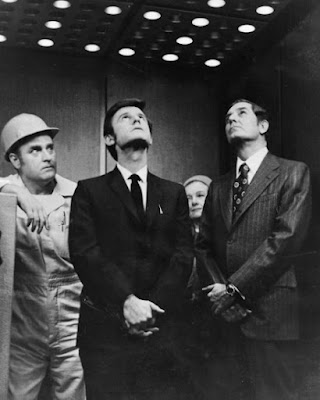 |
"Now get me the hell out of here...!"
|

















































